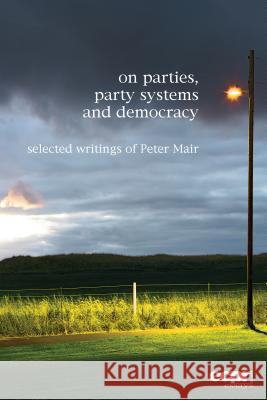On Parties, Party Systems and Democracy: Selected writings of Peter Mair » książka
On Parties, Party Systems and Democracy: Selected writings of Peter Mair
ISBN-13: 9781910259184 / Angielski / Miękka / 2014 / 666 str.
On Parties, Party Systems and Democracy: Selected writings of Peter Mair
ISBN-13: 9781910259184 / Angielski / Miękka / 2014 / 666 str.
(netto: 267,18 VAT: 5%)
Najniższa cena z 30 dni: 276,72
ok. 16-18 dni roboczych.
Darmowa dostawa!
This collection brings together some of the most significant and influential work by leading comparativist Peter Mair (1951-2011). The selection ranges from considerations on the relevance of concept formation to the study of party systems and party organisations; and from reflections on the democratic legitimacy of the European Union to the future of party democracy. Including frequently cited papers alongside lesser-known work, the writings collected in this volume attest to the broad scope and depth of Mair's insights into comparative party politics, and the changing realities of party government. As such, they form an important and enduring contribution to the study of politics, and a fitting tribute to an inspirational and much-missed figure in the global political science community. Edited and introduced by Ingrid van Biezen, with an intellectual portrait of Peter Mair by Stefano Bartolini and Hans Daalder.
This collection brings together some of the most significant and influential work by leading comparativist Peter Mair (1951-2011). The selection ranges from considerations on the relevance of concept formation to the study of party systems and party organisations; and from reflections on the democratic legitimacy of the European Union to the future of party democracy. Including frequently cited papers alongside lesser-known work, the writings collected in this volume attest to the broad scope and depth of Mairs insights into comparative party politics, and the changing realities of party government. As such, they form an important and enduring contribution to the study of politics, and a fitting tribute to an inspirational and much-missed figure in the global political science community. Edited and introduced by Ingrid van Biezen, with an intellectual portrait of Peter Mair by Stefano Bartolini and Hans Daalder. Peter Mair was undoubtedly one of the most influential figures in the comparative study of parties and party systems in the past quarter century. This volume - a suitable tribute to an intellectual giant in the field of comparative politics - draws together 25 of his most important contributions, and includes superb intellectual portraits by three of his closest colleagues: Stefano Bartolini, Hans Daalder and Ingrid van Biezen.David Farrell, University College Dublin Peter Mair focused on building sophisticated political arguments, significantly linked to existing theoretical knowledge and often innovating it, solidly grounded in a detailed knowledge of cases and always open to revisions and refinement. Even in his most academically sophisticated analyses, Peter always started and eventually concluded with a reference to, and a concern for, important substantive political questions and their implications for citizens, leaders, and politics... As most obituaries published shortly after his death have underlined, Peter made a great contribution to the development of succeeding generations of scholars. In the countless conferences, workshops and colloquia he organised, the participation of young, and often very young, scholars was always very significant. He also did much to alert later generations to the contributions of earlier ones, as in his reader The West European Party Systems (1990), his constant confrontation with the work of earlier scholars in his chosen field of party studies, his bringing to light the unpublished work of Sartori, and his pressure on older scholars to put together a volume of their writings. [Mairs] willingness to devote time to read, comment, and help other peoples work is witnessed by the frequency with which he was approached by the most different people. [he was held in] immense esteem among those who knew, encountered or simply contacted him... [this book] marks the stature of an intellectual who was certainly a leading scholar of party politics and European politics of the post-postwar generation, and whose work has been influential in the field for more than thirty years. Stefano Bartolini, Peter Mair Chair in Comparative Politics, European University InstituteHans Daalder, Professor Emeritus, University of Leiden











